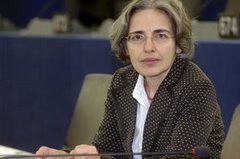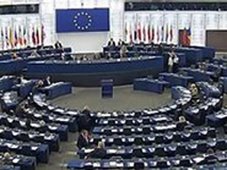17/06/2008: The majority of the European Parliament today adopted a report by Marie Panayotopoulos-Cassiotou MEP at first reading on '2010, the European Year for combating poverty and social exclusion'. The allocated budget - €17m - represents the highest budget ever granted to a European Year, thus demonstrating its high political importance.
The aim of the European Year is to reaffirm the Union's commitment to solidarity, social justice, greater cohesion, and to promote consistency as well as boosting support for the overarching objectives of the Union, by making a decisive impact on the eradication of poverty. Currently in the EU, almost 78m people are living at risk of poverty. The European Year should raise public awareness of poverty and exclusion in Europe as well as convey the message that poverty and exclusion are disruptive to social and economic development. Therefore the purpose of this proposal is to designate 2010 as the European Year for combating poverty and social exclusion.
Mrs Panayotopoulos-Cassiotou's report approves the content of the Commission's proposal and it introduces the following new elements:
The aim of the European Year is to reaffirm the Union's commitment to solidarity, social justice, greater cohesion, and to promote consistency as well as boosting support for the overarching objectives of the Union, by making a decisive impact on the eradication of poverty. Currently in the EU, almost 78m people are living at risk of poverty. The European Year should raise public awareness of poverty and exclusion in Europe as well as convey the message that poverty and exclusion are disruptive to social and economic development. Therefore the purpose of this proposal is to designate 2010 as the European Year for combating poverty and social exclusion.
Mrs Panayotopoulos-Cassiotou's report approves the content of the Commission's proposal and it introduces the following new elements:
- Further develops the concept of multi-dimensional aspects of poverty and social exclusion by a more extensive definition of the groups concerned such as early school leavers and the long-term unemployed;
- Calls for action to be coordinated and implemented at national, regional and local levels in order to reach the goals of the European Year;
- Raises the question of access to and quality of education and lifelong learning, social protection systems and health services, housing, as well as active participation in political and cultural life;
- Stresses a need for an efficient implementation of equal treatment and non-discrimination legislation;
- Draws attention to the importance of ensuring children’s well-being and decent life conditions for all;
- Calls for greater links to be established with previous European Years.
After the positive outcome of the vote, Mrs Panayotopoulos-Cassiotou said: "Thanks to the agreement between the EU institutions, we have achieved the goal of directly planning the European Year's activities. The EPP-ED Group, retaining solidarity as one of its main goals, is always encouraging adequate measures in order to promote more social cohesion."
It is also worth mentioning that in 2006, 16% (78m) of the total EU-25 population lived under the poverty threshold. In 2000, within the EU-25, about 40m people (9% of the total) were confronted with persistent poverty. In 2005, within the EU-25 19%, (19m) children were at risk of poverty. Although in most Member States the gender gap is decreasing, the gender gap is (in 2006) about 2 percent as regards poverty and persistent poverty.
For further information:
Marie Panayotopoulos-Cassiotou MEP
Tel: +32-2-2847447
Fax: +32-2-2849447
E-mail: marie.panayotopoulos-cassiotou@europarl.europa.eu
Notes to Editors:
The EPP-ED Group is the largest political group in the European Parliament with 288 Members from all 27 Member States.
It is also worth mentioning that in 2006, 16% (78m) of the total EU-25 population lived under the poverty threshold. In 2000, within the EU-25, about 40m people (9% of the total) were confronted with persistent poverty. In 2005, within the EU-25 19%, (19m) children were at risk of poverty. Although in most Member States the gender gap is decreasing, the gender gap is (in 2006) about 2 percent as regards poverty and persistent poverty.
For further information:
Marie Panayotopoulos-Cassiotou MEP
Tel: +32-2-2847447
Fax: +32-2-2849447
E-mail: marie.panayotopoulos-cassiotou@europarl.europa.eu
Notes to Editors:
The EPP-ED Group is the largest political group in the European Parliament with 288 Members from all 27 Member States.







